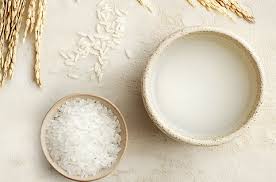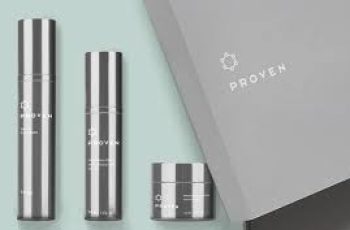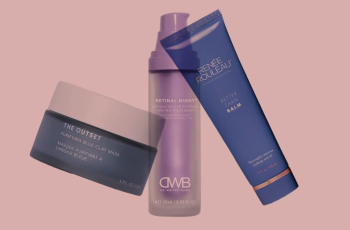
The Science of Rice and Rice Water for Skin
Rice is one of the most common staple foods in the world, and it contains far more nutrients than just calories.
Rice and its byproducts, especially rice water, have firmly established themselves in skin care circles around the world.
This blog post unpacks and simplifies the science of rice and rice water for skin.
I will be referring to Bowman skin types throughout this blog. If you haven’t found your skin type yet, you can take the test by clicking the button below!
What is Rice Used For in Skin Care?
Oryza Sativa in skin care usually refers to pressed rice oil or extract/powder extracted from the hard husk of brown rice. As far as I know, whole grain rice is not used in skin care.
The most common form of rice in skin care products is pressed oil or rice water.
If you are just looking for product recommendations, here are some of my favorite Oryza Sativa skin care products:
(Otherwise, keep reading to learn more about the science of rice.)
What is Rice Water?
Rice water is the cloudy liquid left after washing or cooking rice. Cooking adds many of the beneficial ingredients in rice to the water.
This traditional remedy is known for its soothing, brightening, and anti-aging benefits.
The way rice water is extracted (whether it’s soaked, boiled, or fermented) changes its nutritional profile, making it a versatile ingredient for a variety of skin care products.
Benefits of Rice for Skin
The ingredients listed below offer a variety of benefits for the skin:
Ingredients in rice provide antioxidants to protect the skin, amino acids to regenerate the skin, and minerals to keep it healthy, counteracting issues ranging from dryness and irritation to skin aging and uneven skin tone.
What is rice made of?
Rice, especially the bran and husk, is rich in phenolic compounds, lipids, vitamins, and minerals. Here are some of rice’s most important ingredients:
Ferulic acid: Ferulic acid is a powerful antioxidant that neutralizes free radicals, reduces the effects of harmful UV rays, and stabilizes vitamins C and E in skin care products.
Cinnamic acid: Contributes to rice’s antioxidant properties, protecting the skin from oxidative damage.
p-Coumaric acid: Has antioxidant effects, protecting the skin from environmental damage and reducing signs of skin aging.
Oryzanol: A unique flavonoid found in rice bran known for its anti-inflammatory and antioxidant properties. It reduces skin inflammation and protects the skin from oxidative stress.
Protocatechuic acid: Another antioxidant that helps prevent free radical damage.
Fatty acids: Rice bran oil is rich in fatty acids such as oleic acid and linoleic acid.
These contribute to the moisturizing properties of the oil, strengthening the skin barrier, retaining moisture and keeping the skin hydrated.
Phospholipids: Are important components of cell membranes and play a vital role in maintaining the structure and function of skin cells.
The phospholipids in rice bran oil help restore the skin barrier, protect against environmental impacts and moisturize the skin.
Tocopherols and tocotrienols (Vitamin E): Rice bran oil is a good source of vitamin E and contains tocopherols and tocotrienols.
These compounds have antioxidant effects, protecting the skin from oxidative stress and photoaging while providing moisture.
Oryzanol: A unique antioxidant in rice bran oil, composed of ferulic acid esters and sterols.
Oryzanol has antioxidant, anti-inflammatory and UV protection properties, which help the oil protect the skin from sun damage and aging.
Ceramides: Although found in smaller amounts compared to other sources, ceramides in rice bran can strengthen the skin’s barrier function, prevent moisture loss, and protect against irritants and environmental pollutants.
Oryzanol: Prevents collagen breakdown, thereby preventing wrinkles and sagging.
Inositol: Promotes skin moisture retention, plumping and smoothing the skin.
Amino Acids: Repair and regenerate the skin and promote a healthy barrier.
Minerals (magnesium, calcium, etc.): Essential for skin repair mechanisms and overall health.
These compounds make rice bran oil particularly nourishing and protective for the skin, with moisturizing, antioxidant and barrier-enhancing benefits.
This composition explains why rice bran oil is often used in skin care products that moisturize, repair and protect.
Is rice safe for skin?
Both rice and rice water are considered safe for use in skin care with minimal risk of side effects. Both rice and rice water are considered gentle and suitable for most, if not all, skin types. However, for sensitive skin, a patch test is recommended. Rice and rice water do not contain comedogenic compounds and therefore do not cause acne.
The Environmental Working Group (EWG) and many other organizations classify rice as safe for cosmetic use.
Rice vs. Rice Water
The choice of rice and rice water in a skincare formulation depends on the specific skin concern and desired product texture:
For Dry and Mature Skin: Rice bran oil is high in lipids and is better suited for dry and mature skin, with moisturizing and anti-aging benefits.
For Oily, Sensitive Skin: Rice water is lighter and soothing, better suited for oily or sensitive skin. It moisturizes and smoothes the skin without leaving it overly greasy.
Both rice and rice water have valuable skin care benefits, but their different compositions make them suitable for different skin concerns and product formulations.
Understanding these differences allows us to use each ingredient strategically to maximize the skin health benefits.
Rice and Rice Water for Different Skin Types
Each skin type has its own needs, and not all ingredients are suitable for every skin type.
However, rice’s safety and multiple benefits in skin care make it particularly useful for most, if not all, skin types.
Below I explain how the active ingredients in rice can affect different types of skin.
Dry Skin
I prefer rice oil over rice water for dry skin. Its high concentration of fatty acids makes it an excellent emollient that deeply nourishes the skin and retains moisture.
This oil is particularly beneficial for those with dry or very dry skin, as it helps repair the skin’s natural barrier and prevent further moisture loss.
Learn more about the skin barrier and its ingredients here!
Sensitive Skin
Rice Water: Rice water has soothing properties, making it ideal for sensitive and reactive skin.
It can relieve inflammation, reduce redness, and soothe irritation, providing a gentle solution for skin health without causing irritation.
Rice Bran Oil: Although rice bran oil has a richer texture, it is also suitable for sensitive skin due to its natural anti-inflammatory properties.
It can strengthen the skin barrier and protect against environmental influences that are known to cause sensitivity.
Pigmentation
Studies have shown that ingredients in rice can regulate the production of melanin in the skin when the skin is exposed to UVB radiation.
This means that while rice cannot treat existing dark spots, it can help prevent sun-induced pigmentation.
Aging
Rice oil and rice water are rich in antioxidants that effectively eliminate free radicals.
Free radicals are ionized particles that can damage genes and cause long-term skin damage, and may even lead to cancer.
The polyphenols in rice, such as vitamin E, have been extensively studied for their effects on skin aging products.
Conclusion
Rice and rice water are more than just a staple – they can be a gift to your skin’s health.
They contain natural ingredients that can treat a variety of skin problems and provide an easy and effective addition to your skincare routine.
Take the free Baumann Skin Type Test today to find the best rice products for your skin type!
Thank you for reading this blog.
If you enjoy blogging about ingredients or want to stay up to date on the latest hot topics in skincare, check out our library – we publish something new almost every day!


